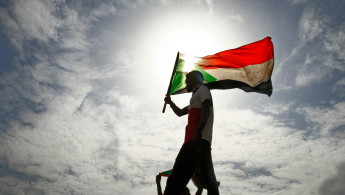Sudan's PM Hamdok urges UN operation to ease democratic transition, peace process
Peace with rebel groups operating in Darfur, Blue Nile and South Kordofan is among the stated goals of Sudan's transitional government.
4 min read
Sudan has around $60 billion in foreign debt [Getty]
Sudanese Prime Minister Abdalla Hamdok has urged the United Nations to establish a fresh peace support operation in the country as Khartoum attempts to cultivate democratic transition, economic renewal and peace with rebel groups.
In a letter to UN Secretary-General Antonio Guterres, Hamdok calls not only for international support for peace-making efforts betwen the transitional government and Sudanese rebel groups but also for a mandate covering the "entire territory of Sudan" and stretching to economic assistance and judicial reform.
The Sudanese government "requests the United Nations to seek a Security Council mandate to establish, as soon as possible, a Chapter VI peace support operation in the form of a special political mission with a strong peacebuilding component", the prime minister writes in the letter dated January 27 and seen by The Sudan Tribune.
A peace support operation (PSO) under Chapter VI would not entail the use of force to prevent the outbreak of conflict.
"What should be urgently deployed are capacities for good offices and mediation support, to assist in the Juba peace negotiations and to help Sudan mobilise international economic assistance including by supporting the upcoming donor conference," Hamdok told Guterres.
Sudan is burdened with a foreign debt of around $60 billion. Under Hamdok, the transitional government has sought to attract international aid to alleviate the punishing economic circumstances – inflation of about 60 percent, soaring unemployment and chronic shortages of fuel and foreign currency – that pushed many to protest against former dictator Omar al-Bashir in December 2018.
Read more: One year after Bashir's downfall, Sudan's revolutionaries sleep with one eye open
|
|
In order to assist peace-building efforts, Hamdok has requested the UN provide "monitoring and technical support" for the "disarmament, demobilisation and reintigration of former fighters, ceasefire monitoring [and] small arms weapons collection".
As well as supporting peace negotiations in the South Sudanese capital and efforts to attract international aid, the UN should "support the implementation" of the constitutional declaration signed in July last year, Hamdok said.
Such support should include "regular monitoring" to ensure its implementation, he added, noting the need for support with regards to "constitutional making, legal and judicial reform, civil service reform and security sector reform".
Hamdok also told Guterres that the peace support operation should help facilitate transitional justice and the repatriation and reinitigration of internally displaced persons (IDPs) and refugees.
"The government would be willing to welcome the mission as soon as possible," he wrote.
"The Sudan transitional model has all the ingredients for success, the risks are also clear and present," Hamdok said.
"The international community, including the United Nations, must step forward now, to help with the urgent issues at hand and to help lay the foundation for Sudan's trajectory towards peace and prosperity."
Under a power-sharing agreement signed between the military and protest leaders last year, the transitional government will be in power until 2022, when democratic elections are expected to take place.
Authority is shared between the joint military-civilian sovereign council currently headed by General Abdel Fattah al-Burhan and the cabinet led by Prime Minister Hamdok.
Protesters have returned to the streets in the capital Khartoum and elsewhere over the past week.
Demonstrations earlier this week rallied against the controversial issue of normalising ties with Israel after Burhan held a secretive meeting with Israeli Prime Minister Benjamin Netanyahu on Monday.
Protesters in a number of states have called for the resignation of military governors seen as holdovers from Bashir's regime, with anger fuelled by rising bread and fuel prices. The demonstrations have more broadly targeted the military component of the transitional government.
Civilian state governors have long been a key demand of protesters, but the transitional governent has hestitated to commit to removing the military governors before the conclusion of the peace negotiations in Juba.
Follow us on Facebook, Twitter and Instagram to stay connected





 Follow the Middle East's top stories in English at The New Arab on Google News
Follow the Middle East's top stories in English at The New Arab on Google News
![Israeli forces ordered bombed Gaza's Jabalia, ordering residents to leave [Getty]](/sites/default/files/styles/image_330x185/public/2176418030.jpeg?h=a5f2f23a&itok=_YGZaP1z)

